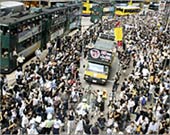Pro-democracy rally held in HK
More than 20,000 people took to the streets of Hong Kong’s Central business district in the third mass rally this month to call for democracy.

Protesters continued their demands that Hong Kong’s Chief Executive, Tung Chee-hwa, who is backed by China, be removed from office and the next leader be popularly elected.
The demonstrations have caused the biggest political crisis faced by the territory since it was handed back to China by Britain in 1997.
“We have a crisis in governance,” Allen Lee, one of Hong Kong’s representatives in China’s National People’s Congress, or parliament, told the protesters.
“Everyone can see how Mr Tung has performed. If not, there won’t be 500,000 people marching in the streets. We have to choose our own leader,” he added.
China concerned
Beijing has sent a delegation to the territory to monitor and discuss the political crisis with researchers, businessmen and pro-democracy opposition lawmakers.
The move has been welcomed by some politicians who called on Tung’s government to do the same.
“At least there is now dialogue (with members of his party). If even Chinese officials can have communication with the Democratic Party, why can’t Mr Tung?” Fred Li, a member of the opposition Democratic Party told reporters.
Priscilla Mak, who attended the protest, said, “This government is one that does not listen. We don’t want a leader who forces on us laws that we don’t like. We want to choose our own leader and I want to teach my child that.”
Anti-subversion law
|
The protests began in the beginning of this month when half a million people turned out on the streets to protest against an anti-subversion law planned by Tung’s government.
Alarmed by the opposition, Tung first watered down and then postponed reading of the bill.
The bill targets crimes against the state and the opposition fears it will be used to suppress free expression and other liberties the territory enjoys – unlike the mainland.
The protests, however, have become an anti-government campaign, demands for universal suffrage and anger at an ailing economy.
Organised by a group called the Democratic Development Network and backed by 30 religious and civic groups, Sunday’s rally called for a popularly-elected leader in 2007 and legislature in 2008.
Tung was chosen by a Beijing-sanctioned commmittee of 800 people in Hong Kong.
The city’s constitution allows for full direct elections after 2007, but gives no timetable.
